专四语法8--虚拟
完整版专四英语语法考点分析解析
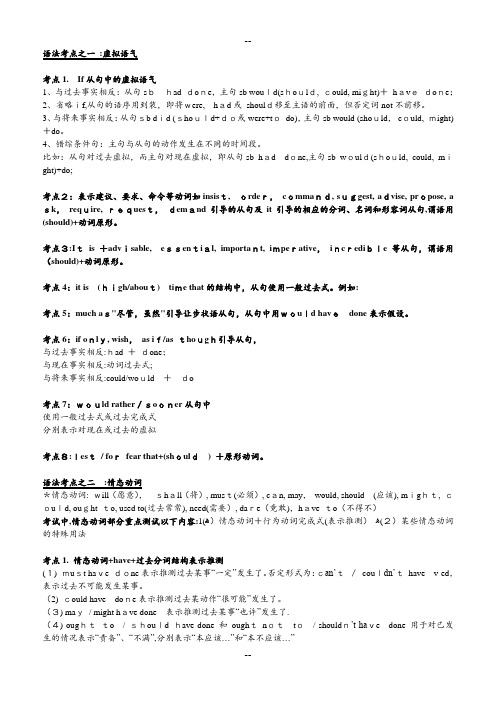
语法考点之一:虚拟语气考点1.If从句中的虚拟语气1、与过去事实相反:从句sbhad done,主句sb would(should, could, might)+havedone;2、省略if,从句的语序用到装,即将were,had或should移至主语的前面,但否定词not不前移。
3、与将来事实相反:从句sb did (should+do或were+todo),主句sb would (should,could, might)+do。
4、错综条件句:主句与从句的动作发生在不同的时间段。
比如:从句对过去虚拟,而主句对现在虚拟,即从句sb had done,主句sb would(should, could, might)+do;考点2:表示建议、要求、命令等动词如insist,order,command, suggest, advise, propose, a sk,require, request,demand引导的从句及it引导的相应的分词、名词和形容词从句,谓语用(should)+动词原形。
考点3:Itis +advisable,essential, important, imperative,incredible等从句,谓语用(should)+动词原形。
考点4:it is(high/about)time that的结构中,从句使用一般过去式。
例如:考点5:much as"尽管,虽然"引导让步状语从句,从句中用would havedone表示假设。
考点6:if only, wish,as if/as though引导从句,与过去事实相反:had +done;与现在事实相反:动词过去式;与将来事实相反:could/would+do考点7:would rather/sooner从句中使用一般过去式或过去完成式分别表示对现在或过去的虚拟考点8:lest/ forfear that+(should) +原形动词。
英语专四语法总结—虚拟语气【卧龙雪痕】
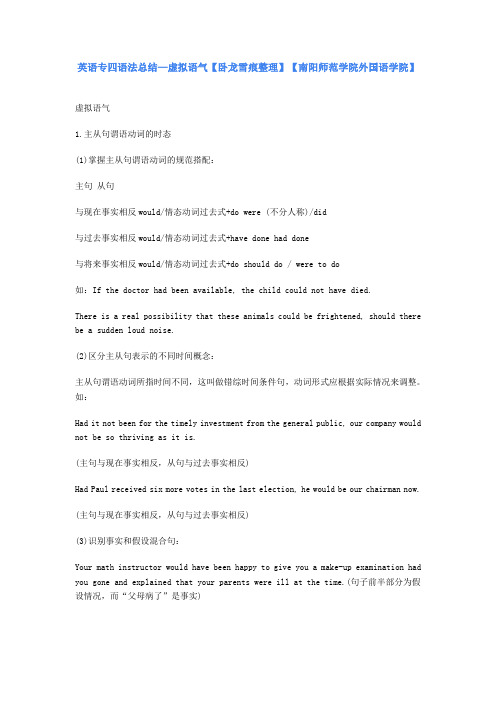
英语专四语法总结—虚拟语气【卧龙雪痕整理】【南阳师范学院外国语学院】虚拟语气1.主从句谓语动词的时态(1)掌握主从句谓语动词的规范搭配:主句从句与现在事实相反would/情态动词过去式+do were (不分人称)/did与过去事实相反would/情态动词过去式+have done had done与将来事实相反would/情态动词过去式+do should do / were to do如:If the doctor had been available, the child could not have died.There is a real possibility that these animals could be frightened, should there be a sudden loud noise.(2)区分主从句表示的不同时间概念:主从句谓语动词所指时间不同,这叫做错综时间条件句,动词形式应根据实际情况来调整。
如:Had it not been for the timely investment from the general public, our company would not be so thriving as it is.(主句与现在事实相反,从句与过去事实相反)Had Paul received six more votes in the last election, he would be our chairman now.(主句与现在事实相反,从句与过去事实相反)(3)识别事实和假设混合句:Your math instructor would have been happy to give you a make-up examination had you gone and explained that your parents were ill at the time.(句子前半部分为假设情况,而“父母病了”是事实)I would have gone to visit him in the hospital had it been at all possible, but I was fully occupied the whole of last week.前半部分为假设,后半部分是事实)2.名词性从句的虚拟形式名词性从句是指宾语从句、主语从句、表语从句和同位语从句。
英语四级考试中的虚拟语气

英语四级考试中的虚拟语气英语四级考试中的虚拟语气虚拟语气在宾语从句中的用法是一个常见的考点,我们着重讲一下宾语从句常使用虚拟语气的几类特殊动词,以及这些动词的用法、构成虚拟语气的用法等。
下面是店铺为大家带来的英语四级考试中的虚拟语气,欢迎阅读。
一、何谓虚拟?在英语中,语气(mood)和时态,语态一样,都是谓语动词的一种形式。
表明说话的目的和意图,虚拟语气即表示说话人主观愿望或纯假设情况,动词需用特殊形式。
例如If I were a boy。
其中谓语动词用were,而不是am, shall, was, have等,是因为说话人为女士,而“我是男人”仅是其假设的语气,故用了一个在现实情况中绝不可能用到的were来表达这一虚拟的情况。
通过在I的后面加were这一词,能得知这是虚拟假设出来的情况。
常见的虚拟有两种:1. 表示非真实假设情况:If If I had left sooner, I could have caught the train。
如果早点出发,我就能赶上火车了。
(但我事实上已经错过了,对过去的假设虚拟)He talks so loud as if I were deaf。
他说话声太响,就像我聋了一样。
(但事实我没聋,对现在的假设虚拟)这种情况虚拟时,只需将谓语动词变本身的时态再变过去。
第一句话中的虚拟,本身为过去时,因此再变过去,即过去完成时。
left变为had left, could catch变为could have caught。
第二句话中,as if I am deaf,需要对现在假设,因此变为as if I were a deaf。
(不用I was deaf,避免与真实情况过去式混淆)类似表示非真实情况的`词还有wish希望, suppose假设, would rather宁愿, but for要不是等。
2. 表示建议、命令、要求等主观意愿:He suggested that a petition (should) be drawn up。
专四语法--虚拟语气
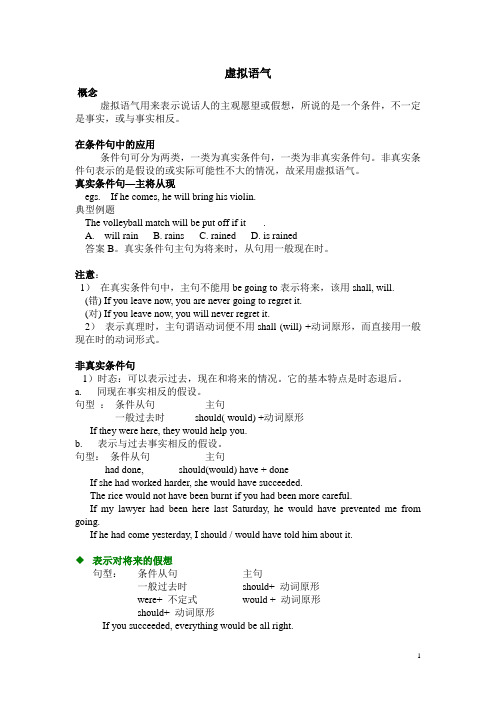
虚拟语气概念虚拟语气用来表示说话人的主观愿望或假想,所说的是一个条件,不一定是事实,或与事实相反。
在条件句中的应用条件句可分为两类,一类为真实条件句,一类为非真实条件句。
非真实条件句表示的是假设的或实际可能性不大的情况,故采用虚拟语气。
真实条件句—主将从现egs.If he comes, he will bring his violin.典型例题The volleyball match will be put off if it ___.A.will rainB. rainsC. rainedD. is rained答案B。
真实条件句主句为将来时,从句用一般现在时。
注意:1)在真实条件句中,主句不能用be going to表示将来,该用shall, will. (错) If you leave now, you are never going to regret it.(对) If you leave now, you will never regret it.2)表示真理时,主句谓语动词便不用shall (will) +动词原形,而直接用一般现在时的动词形式。
非真实条件句1)时态:可以表示过去,现在和将来的情况。
它的基本特点是时态退后。
a.同现在事实相反的假设。
句型:条件从句主句一般过去时should( would) +动词原形If they were here, they would help you.b.表示与过去事实相反的假设。
句型:条件从句主句had done,should(would) have + doneIf she had worked harder, she would have succeeded.The rice would not have been burnt if you had been more careful.If my lawyer had been here last Saturday, he would have prevented me from going.If he had come yesterday, I should / would have told him about it.表示对将来的假想句型:条件从句主句一般过去时should+ 动词原形were+ 不定式would + 动词原形should+ 动词原形If you succeeded, everything would be all right.If you should succeed, everything would be all right.If you were to succeed, everything would be all right.混合条件句主句与从句的动作发生在不同的时间,这时主,从句谓语动词的虚拟语气形式因时间不同而不同,这叫做混合条件句。
英语四级高级语法讲解:虚拟语气

英语四级高级语法讲解:虚拟语气虚拟语气是说话者用来表示假设,或难以实现的情况,而非客观存在的事实,所陈述的是一个条件,不一定是事实,甚至完全与事实相反。
下面是作者整理的英语四级高级语法讲解:虚拟语气,欢迎大家阅读学习。
引导的虚拟语气2.倒装形式Were I you(=if I were you),I would get up early in the morning.Had you arrived at the station ten minutes earlier yesterday(=If you had arrived…),you could have caught the train.Should it rain(=If it should rain),the crops would be saved.It is time that ...Would rather that.....(1)I would rather he came tomorrow than today.(2)John would rather that she had not gone to the party yesterday evening.(3)I would rather everything hadn t happened in the past.“It is(was)+形容词(或过去分词)+that……”结构中的虚拟语气is necessary that we(should 可省略,下同)have a walk now.was necessary that we(should) make everything ready ahead of time.is required that nobody(should) smoke here.is important that every pupil(should) be able to understand the rule of school.练习’ll be busy this he ___ free,he ___ to the cinema with you.to be; might go going to be; will gobe; might have gone ; will goEdison died,it was proposed that the American people _____ all power in their homes,streets,and factories for several minutes in honor of this great man.off offturn off turned offI known her name,_____.does she know mine? where does she live?would have invited her to lunch would be beautiful’d rather you ______ by train,because I cant bear the idea of your being in an airplane in such bad weather.go gogonevictim ________(本来会有机会活下来) if he had been taken to hospital in time.would have a chance to survive(翻译)professor required that ________(我们交研究报告)。
专四语法讲解(虚拟语气)
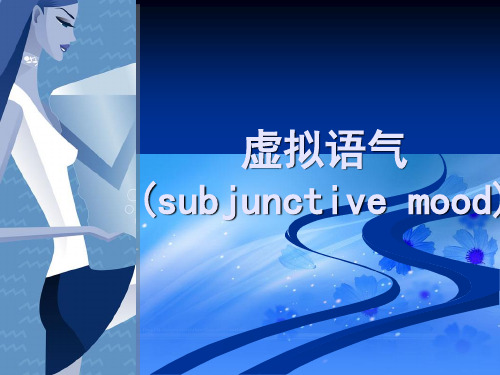
1. 虚拟条件句
1. 形式
虚拟条件句包括与现在事实相反的虚拟条 件句和与过去事实相反的虚拟条件句,以 及将来实现可能性很小或根本不可能实现 的虚拟条件句。
主 句(principal clause) 与现在事实相反 would/情态动词 Contrary to what is (Model Verbs)过去 式+do now
(2)介词短语暗含假设条件,常用的有:without, but for, under more favorable conditions等。如:
But for your timely advice, I would never have known how to go about the work.(94年) The storm delayed us. But for the storm we would have been in time. Supposing I accepted this offer, what would you say? Without your timely help, my daughter would have drowned.
eg. I move that he be discharged for his serious mistake. She demanded that we attack at once. The job would require that he be at the factory at 7 o’clock every morning.
(2)祈使语气 (imperative mood) 祈使语气用来表示请求、命令和劝告等。 eg. Don’t be late. Be quiet! Let’s have a break.
【优质文档】专四语法虚拟语气

二,虚拟语气Ⅰ.条件状语从句中的虚拟语气①.基本形式 if 从句主句与现在相反过去时(were) would/could/should/might+ do与过去相反过去完成时would/could/should/might+havedone与将来相反 were to would/could/should/might+ doshould/could▲should也可以引导一个条件句,但所假设的事一般不会发生,且后面的主句(一般为祈使句)不能倒装。
②.倒装:如果条件句中的谓语动词含有were,should,had时,可以省略if,把三个词放在主语之前构成倒装,如果句子是否定句,not不跟着提前。
Eg. If he had come a little earlier, I might have met him.Had he come a little earlier, I might have met him.If he were to leave tomorrow, I would go with go with him.Were he to leave tomorrow, I would go with him.③.错综时间的虚拟条件状语Eg. If I had studied hard, I would be in a very comfortable office now.If you were older, I would have let you go yesterday.④.含蓄的虚拟条件状语从句:无if从句的出现,用其他形式表示出虚拟的意义,常见的词和词组:without, in the absence of,Otherwise, but for, butEg. Without your help, I couldn't have done it well.If you had not helped me, I couldn't have done it well.In the absence of water, plants couldn't grow well.If there were no water, plants couldn't grow well.He was held up in the traffic, otherwise, he wouldn't have been late If he hadn't been held up in the traffic, he couldn't have been late.But for the rain, our trip would have been pleasant.But for the rain, we would have a pleasant trip.If it hadn't rain, we would have a pleasant trip.I could have written the paper before, but I was still.II.其他状语从句中的定语从句ⅰ.让步状语从句在whethe r…or,though,no matter等引导的状语从句中,谓语经常用should/may+v.原,在这个句型中,可以将whether省略(or不可省),though,no matter省略,再省略should和may,而把动词be放在主语前面,构成倒装Eg. Everything around us, whether it may be/should be air, orwater, or stone, is matter.Everything around us, be it air or water, or stone, ismatter.Though he should/may be too weak to walk too much, I willadvise him to walk a little every day.Be he too weak to walk too much, I will advise him to walka little every day.ⅱ.在lest,in case,for fear that…引导的原因状语从句中,从句经常用should+v.原表示虚拟,其中in case可用陈述语气。
专四之虚拟语气
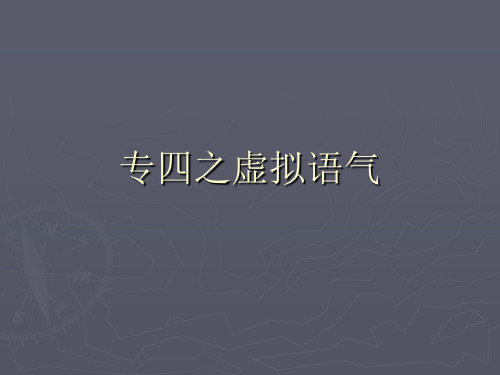
为were)
+ 动词原形
与过去事实相 动词的过去完成
反
式(had +动词的
过去分词)
Would (should,
could, might) + have + 动词的过 去分词
与将来事实相 1. 动词的过去式 Would (should,
反
(be 为were) could, might) +
2. Were + 不定式 动词原形
在某些从句中的应用
►1) 在表示愿望、建议、命令等主观意向的主 语从句中:
►以下真题都属于虚拟语气在表示主观意向或 祈使语气的主语从句中的应用,that从句使 用“(should)+动词原形”的形式。
►这种虚拟结构常见有:it is desired, it is suggested, it is requested, it was ordered, it was proposed, it is necessary (important, essential, imperative, advisable, desirable, preferable, better, best, proper, vital, crucial, etc.), it has been decided。
TEM 4 系列辅导
虚拟语气概要:
现代英语中有三种语气: 1.陈述语气(indicative mood) 2.祈使语气(imperative mood) 3.虚拟语气(subjunctive mood)
虚拟条件句结构表
If 从句
主句
与现在事实相 动词的过去式(be Would (should)
反
► 答案:A。通常情况下,虚拟条件从句如果使用的 是过去完成时,主句则使用“would + have done” 形式,表示对过去情况的假设。但当条件从句表示 的动作和主句表示的动作,发生的时间不一致时, 比如这句话,条件从句是对过去情况的假设,而主 句却是对被提问者现场当时感受的假设,主句动词 的形式就要根据表示的时间调整,采用“would + 动词原形”的形式。这种句子可以成为“错综时间 条件句”。有时情况跟此句正好相反,如:If you were in better health, we would have allowed you to join them in the work.
英语专业四级虚拟语气语法考点
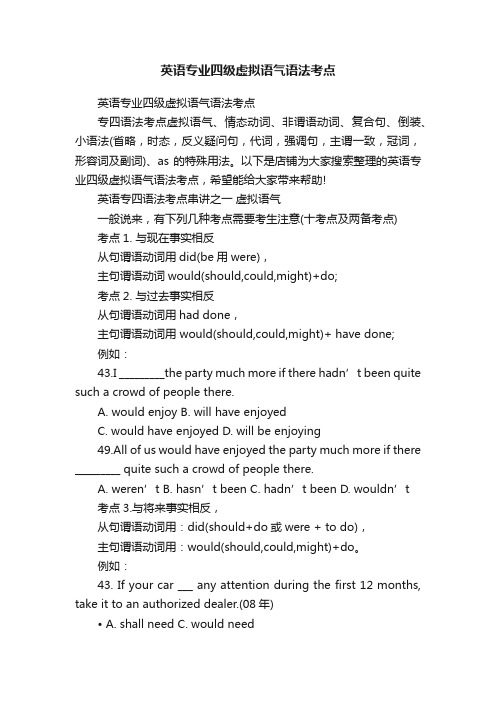
英语专业四级虚拟语气语法考点英语专业四级虚拟语气语法考点专四语法考点虚拟语气、情态动词、非谓语动词、复合句、倒装、小语法(省略,时态,反义疑问句,代词,强调句,主谓一致,冠词,形容词及副词)、as的特殊用法。
以下是店铺为大家搜索整理的英语专业四级虚拟语气语法考点,希望能给大家带来帮助!英语专四语法考点串讲之一虚拟语气一般说来,有下列几种考点需要考生注意(十考点及两备考点)考点1. 与现在事实相反从句谓语动词用did(be用were),主句谓语动词would(should,could,might)+do;考点2. 与过去事实相反从句谓语动词用had done,主句谓语动词用 would(should,could,might)+ have done;例如:43.I _________the party much more if there hadn’t been quite such a crowd of people there.A. would enjoyB. will have enjoyedC. would have enjoyedD. will be enjoying49.All of us would have enjoyed the party much more if there _________ quite such a crowd of people there.A. weren’tB. hasn’t beenC. hadn’t beenD. wouldn’t考点3.与将来事实相反,从句谓语动词用:did(should+do或were + to do),主句谓语动词用:would(should,could,might)+do。
例如:43. If your car ___ any attention during the first 12 months, take it to an authorized dealer.(08年)• A. shall need C. would need• B. should need D. will need考点4. 时态的交叉现象,也就是主句与从句的动作发生在不同的时间段例如:If you had gone to see the doctor,you would be all right now.你要是早去看病,你现在就没事了。
四级必用虚拟语气非常完整版

虚拟语气学习虚拟语气的三个必知英语一共有三种语气形式,所有的祈使句都是祈使语气,其他非祈使句的句子或者属于陈述语气,或者属于虚拟语气。
学习虚拟语气必须明确了解以下三点:1、英语的所谓“虚拟语气”,从用途上区别有三种:一种用来表达与实际情况相反的虚构假设,一种用来表达“祈使愿望”的口气,另一种满足特殊的句式需要。
虚拟语气:(1)用来表示说话人的主观愿望、请求、意图、建议、怀疑、假设等;(2)可能性很小或不可能成为客观事实的情况,常用于非真实条件句中 虚拟语气并不全是在表达虚构的情况,理解这一点非常重要。
2、虚拟语气从句式表现上有三种:表达与实际情况相反的虚构假设用were 式虚拟,表达“祈使愿望”的口气be 式虚拟,在特殊句式中的照句式要求而定。
3、学习虚拟语气,其目的不在于单纯解决语法问题,更不能停留在应试的层面上。
掌握虚拟语气的用法对英语的阅读理解非常重要,尤其是进入大学以后,这一点更为重要。
一、虚拟条件句:非真实条件句虚拟条件句因为有虚拟语气,所以条件句中的条件是不可能的,主句的结论也是想象的,非真实的,不可能的。
1. If it rains tomorrow, our trip will be put off.如果明天下雨,我们的旅行就延后(真实条件句)2. If he hadn ’t hurt his legs yesterday, he would go with us now.要是他昨天没有伤到腿,现在他就会跟我们一起去。
(虚拟)虚拟条件句的基本形式1. If it _______ not for the fact that he is ill, I _______ him to do this right now.要不是他现在病了,我就让他现在去办这件事。
Were would ask2. If we _______ adequate preparations, the conference _______ so successful.如果我们不是做了充分的准备,这次会议就不会这么成功。
英语专业四级虚拟语气
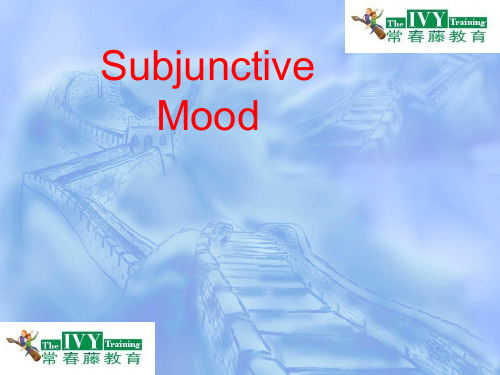
▪ 主要手法
▪ 过去时态的虚拟
▪ 主要出现在if, if only, as if
▪
wish, would rather
▪
it is time that
考点一:用于非真实条件句(过去式
1 与现在事实相反:if 条件句中用一般过去时,主句用 should/would/could/might+动词原形
考点六:用于it is (about / high/ getting) time后that从句
I’d rather you ____ by train because the weather forecast said there would be heavy snow tomorrow. ▪ A. went B. should go C. will go D. go
▪ 我宁愿你乘火车去…, would rather 后接虚拟 语气的从句,用一般过去时。答案 A
虚拟语气的类型(三种)
▪ 原型虚拟 (Be) ▪ Were型虚拟(可以用was,也是过去式) ▪ 过去时态虚拟 ▪ Be he rich or poor, I will marry him all the same. ▪ If only I were a millionaire. (现在状态相反) ▪ I would rather you had come to our April Fool’s
▪ 0652. If only I ____ play the guitar as well as you!
▪ A would ▪ 答案 B
B could C should D might
考点五 在would rater, would sooner, would just as soon 从句
专四常见虚拟总结
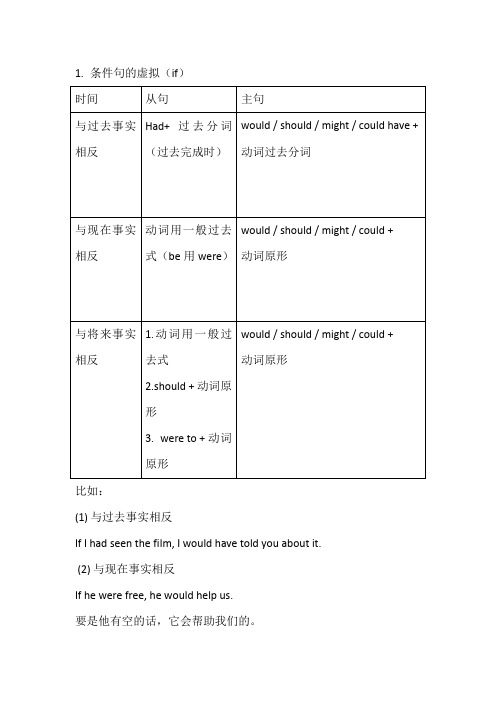
1.条件句的虚拟(if)比如:(1) 与过去事实相反If I had seen the film, I would have told you about it.(2) 与现在事实相反If he were free, he would help us.要是他有空的话,它会帮助我们的。
(3). 与将来事实相反If he were to come here, he would tell us about it.如果他要来的话,他会通知我们一声。
If he studied at this school, he would know you well.如果他在这所学校学习的话,它会对你很熟悉。
注意省略if的倒装形式,比如:If I had studied hard, I would have passed the exam.Had I studied hard, I would have passed the exam.2. 一些表示请求、要求、命令或建议等意义的动词所接的宾语从句advise, ask, demand, desire, decide, insist, order, propose, request, sugge st其虚拟语气的结构为:(should) + 原形动词。
如:The teacher advised that we should make good use of every minute her 老师劝我们要好好地利用在这儿的每一分钟。
The Party asked that we should serve the people with our heart and soul 党要求我们要全心全意地为人民服务注意suggest和insist这两个词,当insist的意思为:坚决认为,坚持说;suggest的意思为:表明,暗含,暗示等时,宾语从句不用虚拟语气。
如:Tom insisted that he hadn’t stolen the watch.汤姆坚持说他没有偷那块手表。
四级虚拟语气详解

英语的动词一般可带有三种不同的语气:陈述语气,祈使语气和虚拟语气。
虚拟语气是一种特殊的动词形式:一是用来表示说话人所说的话不是一个事实,而是一种假设、猜测、怀疑等(在条件从句中或让步状语从句中);二是表示说话人的愿望、要求、命令、建议等(在宾语从句、表语从句、同位语从句)。
一、虚拟语气在条件句中虚拟条件句主句与现在事实相反的假设If+主语+动词的过去式(动词be用were)主语+should,would,might,could+动词原形与过去相反的假设If+主语+had +过去分词主语+should, would, might,could+have done与将来相反的假设1、If+主语+动词过去式2、If+主语+were to+ 动词原形3、If+主语+should +动词原形主语+should, would,might,could+动词原形eg: If I had time, I would attend the meeting.If he had hurried ,he could have caught the train.If I were to go abroad ,I would go to America.注意:使用虚拟条件句要注意的几点:当条件状语从句表示的行为和主句表示的行为所发生的时间不一致时,被称为:错综时间条件句“,动词的形式要根据它所表示的时间作出相应的调整1、If you had followed my advice , you would be better now.如果你听我的建议,你现在就会痊愈了.2、If you had studied hard before, you would be a college student now.如果你努力学习的话,你现在就会是大学生了.错综时间条件句例题:Had you listened to the doctor, you _____ all right now.A.areB. wereC. would beD. would have been 解析:这是个混合型的虚拟语气,前面是个省略加倒装句,还原后是 If you had listen to the doctor, you would be all right now. 如果你当初听医生的话,现在病都好了。
专四英语之虚拟语气用法和主谓一致知识讲解
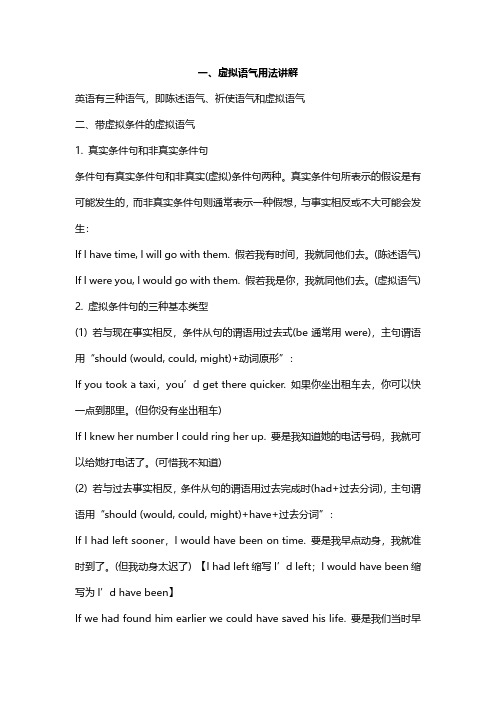
一、虚拟语气用法讲解英语有三种语气,即陈述语气、祈使语气和虚拟语气二、带虚拟条件的虚拟语气1. 真实条件句和非真实条件句条件句有真实条件句和非真实(虚拟)条件句两种。
真实条件句所表示的假设是有可能发生的,而非真实条件句则通常表示一种假想,与事实相反或不大可能会发生:If I have time, I will go with them. 假若我有时间,我就同他们去。
(陈述语气) If I were you, I would go with them. 假若我是你,我就同他们去。
(虚拟语气) 2. 虚拟条件句的三种基本类型(1) 若与现在事实相反,条件从句的谓语用过去式(be通常用were),主句谓语用“should (would, could, might)+动词原形”:If you took a taxi,you’d get there quicker. 如果你坐出租车去,你可以快一点到那里。
(但你没有坐出租车)If I knew her number I could ring her up. 要是我知道她的电话号码,我就可以给她打电话了。
(可惜我不知道)(2) 若与过去事实相反,条件从句的谓语用过去完成时(had+过去分词),主句谓语用“should (would, could, might)+have+过去分词”:If I had left sooner,I would have been on time. 要是我早点动身,我就准时到了。
(但我动身太迟了) 【I had left缩写I’d left;I would have been缩写为I’d have been】If we had found him earlier we could have saved his life. 要是我们当时早点找到他的话,我们就可以救活他。
(可惜我们找到他太晚了)(3) 若与将来事实相反:条件从句a)If+主语+动词过去式;b)If+主语+were to+动词原形;c)If+主语+should+动词原形(注意不能是would)。
专四语法精讲-虚拟语气(内部资料)
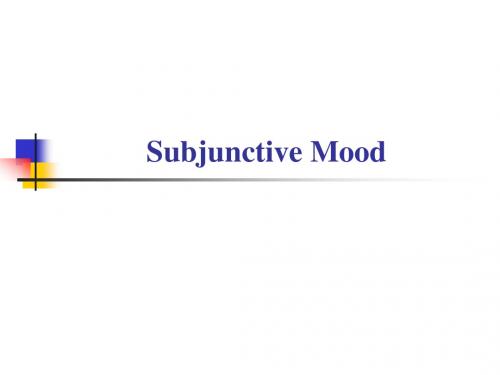
if only和would that后用虚拟语气:谓语 动词用一般过去时表示现在没有实现的 的愿望,用过去完成时表示过去没有实 现的愿望,常译为“要是….就好了”。 例如:If only she had known where to find you. Would that I had seen her before she died. 在她死前我能见她一面就好了
Subjunctive Mood
虚拟条件句
条件从句 与现在事实相反 If I (we, you, he, she, it, they)+ 动词过去式(be动词的过去式 一律用were) 与过去事实相反 If I (we, you, he, she, it, they) + had +过去分词 If I (we, you, he, she, it, they) +would have +过去 分词 与将来事实相反 A式:一般过去式 B式:were +不定式 C式:should + 动词原形 Would (should) +动词原 形 结果主句 I (we, you, he, she, it, they) + would +动词原形
What would people say about him, whose wife should take bribes?
要是他的妻子接受贿赂的话,人们会怎样说他呢? (定语从句)
含蓄条件句:有些句子中,没有任何表 示虚拟语气的词、短语或从句,但仍要 用虚拟语气。这是要么是省略了表示虚 拟语气的部分,要么隐含在上下文中, 称为含蓄条件句。 例如:I would do anything for you. (if I could)
专四——虚拟语气

在表示命令、建议或要求等动词后的宾语从句中要 求用虚拟语气,从句谓语形式 :should+ 动词原 形。
It is +形容词/名词/过去分词/+that引导的主语从 句,从句谓语形式 :should+ 动词原形。
Lest, in case, for fear that”以防,万一”引导目 的状语从句常用虚拟语气,从句谓语形式: should+ 动词原形。 Lest, for fear that从句中 should可省去, in case从句中should通常不省 去
4.在wh-ever, however ,no matter,等引导的让步状语从句中,从句虚拟语气的结构为: may+ 动词原形 (指现在或将来)或 may+完成式(指过去),主句结构不限。
Should/would/could/might+ have+过去分词
Should/would/could/might+ 动词原形
省略if虚拟条件句的用法 在虚拟条件句中,如果从句中含有were,had,或should等词时,可将if省略,把were,had或should
等提到主语之前,引起倒装。
Eg: Had you not helped me, I should have failed.
虚拟语气
副标题
If非真实条件句中的基本用法
假设类型 与现在事实相反
与过去事实相反
与将来事实相反
条件从句谓语动词形式 一般过去式(be用were)
Had+过去分词
动词过去式,(should+)动词 原形,were ld/could/might+ 动词原形
其他句型虚拟语气
专四语法虚拟语气
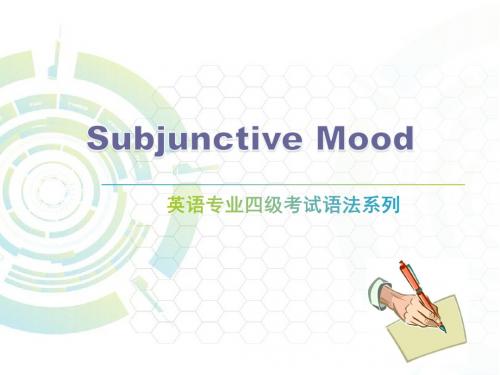
4
3.专业四级考试语法与词汇部分每年至少有一道 相关试题涉及虚拟语气,平均下来达到每年1-2 题,总计有24题。
年 02 03 04 05 06 07 08 09 10 11 12 13 14 15 合 份 计 题 2 1 3 3 4 2 1 1 1 1 1 2 1 1 24 数
5
看例句,总结虚拟语气结构
B. She used to drive to work, but now she takes the city metro. C. Walk straight ahead, and don't turn till the second traffic lights. D. Paul will cancel his flight if he cannot get his visa by Friday.
15
例2:If only the patient______ a different treatment instead of using the antibiotics, he might still be alive now.(2007:54) A. had received C.should receive B. received D.were receiving
[C]
13
2: _______ before we depart the day after tomorrow, we should have a wonderful dinner party.
A. Had they arrived
B. Would they arrive
C. Were they arriving D. Were they to arrive
- 1、下载文档前请自行甄别文档内容的完整性,平台不提供额外的编辑、内容补充、找答案等附加服务。
- 2、"仅部分预览"的文档,不可在线预览部分如存在完整性等问题,可反馈申请退款(可完整预览的文档不适用该条件!)。
- 3、如文档侵犯您的权益,请联系客服反馈,我们会尽快为您处理(人工客服工作时间:9:00-18:30)。
It is (high) time…
• 02: • 51. “What courses are you going to do next semester?” • “I don’t know. But it’s about time ______ on something.” • I’d decide • I decided • I decide • I’m deciding
It is (high) time…
• 99: • 49. If you have really been studying English for so long, it’s about time you ______ able to write letters in English. • a. should be • b. were • c. must be • d. are
It is (high) time…
• 06: • 54. It’s high time we ______ cutting down the rainforests. • a. stopped • b. had to stop • c. shall stop • d. stop
It is (high) time…
固定句型
• 对现在虚拟用一般过去,对过去虚拟用过 去完成 • It is about / high time that … • would rather sb… • …wish… • If only… • …as if…
单用句型
• • • • • should have done should not have done needn’t have done would have done could have done
过去虚拟倒装
• 08 • 52. Had Judy been more careful on the maths exam, she ____ much better results now. • A. would be getting • B. could have got • C. must get • D. would get
if + should do/were to do, 拟 混合虚拟 • 省略IF的虚拟倒装形式 Had/ Were/ Should…, 省略 的虚拟倒装形式
(Should) do
• …suggest, propose, ask, command, demand, require, urge, order, recommend, insist等表示要求命令的动词及对应名词,过 动词及对应名词, 动词及对应名词 去分词+that + (should) do 去分词 (*suggest/ recommand/ insist有时不用虚拟) • It is + strange, important, necessary, essential, urgent, natural, unusual, advisable, desirable, vital + that + (should) do
• 05: • 60. That was not the first time he ______ us. I think it’s high time we ______ strong actions against him. • a. betrayed… take • b. had betrayed… took • c. has betrayed… took • d. has betrayed… take
(Should)+动词原形
• 04: • 46. It is imperative that students ______ their term papers on time. • a. hand in • b. would hand in • c. have to hand in • d. handed in
将来虚拟
• 98: • 43. If your car ______ any attention during the first 12 months, take it to an authorized dealer. • a. shall need • b. should need • c. would need • d. will need
对现在虚拟
• 05: : • 51. If you explained the situation to your solicitor, he ______ able to advise you much better than I can. • a. would be • b. will have been • c. was • d. were
(Should)+动词原形
• 97: • 43. He left orders that nothing _____ touched until the police arrived here. • A. should be • B. ought to be • C. must be • D. would be
(Should)+动词原形
• 06: • 59. It is imperative that the government ______ more investment into the shipbuilding industry. • a. attracts • b. shall attract • c. attract • d. has to
If only虚拟= I wish
• 06: • 52. If only I ______ play the guitar as well as you! • a. would • b could • c. should • d. might
• 07 • 54. If only the patient ______a different treatment instead of using the antibiotics, he might still be alive now. A.had received • B. received • C.should receive • D.were receiving
过去虚拟
• 97: • 51. I was to have made a speech if ______. • a. I was not called away • b. nobody would have called me away • c. I had not been called away • d. nobody called me away
虚拟语气
IF从句类虚拟
• 与现在事实相反: 现在事实相反
if + 一般过去(若be were), would/could/should do 一般过去 若
• 与过去事实相反 过去事实相反: 事实相反
if + 过去完成时, would/could/should have done
• 与将来事实相反 将来事实相反: 事实相反
过去虚拟
• 00: • 49. All of us would have enjoyed the party much more if there ______ quite such a crowd of people there. • a. weren’t • b. hasn’t been • c. hadn’t been • d. wouldn’t be
过去虚拟倒装
• 02: • 50. ______ for the fact that she broke her leg, she might have passed the exam. • a. Had it not been • b. Hadn’t it been • c. Was it not • d. Were it not
将来虚拟倒装
• 63. ______ you ______ further problems with your printer, contact your dealer for advice. • a. If, had • b. Have, had • c. Should, have • d. In case, had
